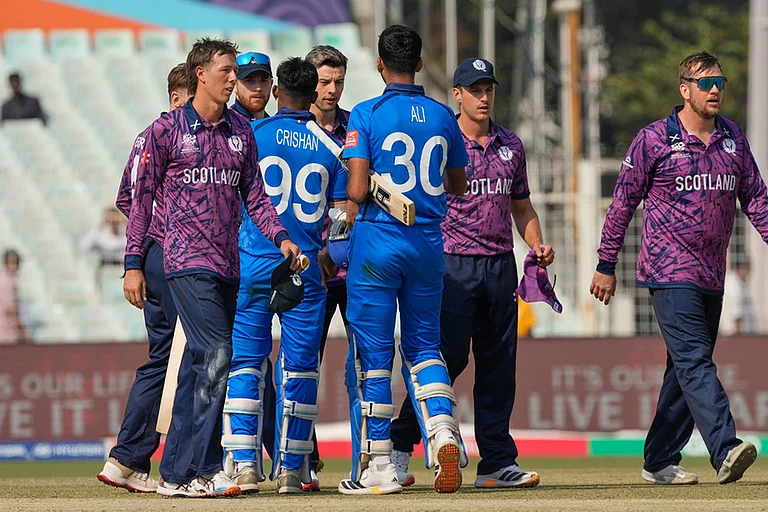Is anybody sorry for the sudden interruption? Certainly not the Indian government. Nor all those satellite TV players who have drawn up plans to enter the direct-to-home (DTH) TV sector in collaboration with foreign partners but arent quite ready with the requisite ingredients yet. But Hong Kong-based Star TV, which has reportedly invested $80 million for the first year of its proposed digital DTH service in India, has reason to be aggrieved. All set to launch its DTH platform, it now faces a temporary blackout.
The July 16 department of telecommunications (DoT) notification banning DTH services in the frequency band of 4,800 MHz and aboveuntil the Broadcast Authority of India is put in place to grant licences for and regulate such serviceshas dealt a severe blow to Stars ambitious plans to launch a 40-channel Sky TV DTH bouquet. For its DTH platform, Star has leased seven Ku-band transponders on PanAmSat-4 at $2.7 million each per annum. Add to that the incremental expenditure the Rupert Murdoch-owned company incurs on running its Indian DTH establishmentit currently has 85 employees, including several top-notch former DD officials, and the losses run into millions of dollars. Pushed to the wall, Star TV has filed a petition in the Delhi High Court and is pinning its hopes on a favourable verdict.
So are Indian satellite TV viewers. Having been at the mercy of unprofessional, grumpy, hard-to-get cable operators whose idea of service ends with the collection of monthly subscriptions from viewers, they are now on the threshold of a new era of quality service, while the industry itself is perched at the cutting edge of broadcast technology. "By stopping DTH, you are only missing out on technology," says Rathikant Basu, CEO, Star TV India.
The worry in Star TVs top echelons is that the Broadcasting Bill, currently before a joint select committee of Parliament, is unlikely to become law this year. And even if it is passed by Parliament during the winter session, the process of setting up the Broadcast Authority of India will take a few more months. Until then, DTH television will remain on the backburner, depriving Star TV of a headstart and the viewers of the opportunity of accessing state-of-the-art technology. "The ban is only a temporary measure, a legal device to prevent any illegal DTH service. Such services will be allowed once the Broadcast Bill becomes law," explains information and broadcasting minister S. Jaipal Reddy. "The ban indicates the governments stance that it does not favour the commencement of DTH telecast pending a comprehensive broadcast policy for the industry. Hence, the ban does serve a purpose," says Ashok Mansukhani, chief operating officer, IN Network. The company is a part of the Hinduja empire and is on the verge of tying up with General Electric, which owns NBC, for a DTH platform. Other Indian companies reported to be in the race to launch DTH services are K.K. Modis Modi Entertainment Group and Subhash Chandra Goyal of Zee TV.
The explanatory memorandum to the DoT notification states: "The new technology would enable any broadcaster within or outside India to telecast or beam any programme of his choice directly to the houses and bedrooms of the general public". Hence the ban on DTH services. Star TVs counsel Kapil Sibal argued in court on July 22 that the notification discriminates between DTH services in the C-band (below 4800 MHz) and the Ku-band (above 4800 MHz), exempting the former from licensing while imposing a ban on the latter. He pointed out that the channels proposed to be carried by the petitioner in the DTH platform "were substantially the same as those that already exist on C-band with the addition of a few entertainment, educational, childrens channels as well as money and news channels and would in no way pose any threat to national security".
The Delhi High Court has given the government three weeksit had asked for four monthsto reply to its show-cause notice. On July 22, Sibal argued that the ban on the use of certain DTH equipment was violative of the fundamental right to information as enshrined in the Constitution. The next hearing in the case has been fixed for August 28.
The court case apart, the Sky TV office in New Delhi is now witnessing a flurry of activity. Two senior officials from Star TVs Hong Kong office, including CEO Gary Davey, were in New Delhi for two days to take stock of the damage that the DTH ban will inflict. While the government talks of ensuring a level playing field for all DTH players, the feeling in certain quarters is that a strong lobby of Indian broadcasters has joined hands with some government officials who are out to cut former bureaucrats like Basu and Urmila Gupta, Stars executive director (DTH), down to size. "They are worried that we will deliver, that we might dominate the scene if our progress is unhindered," says Basu.
It is clearly a corporate proxy war that Stars rivals are fighting, prompted not so much by concern for national security as by pure business considerations. Since there is no bar on DTH telecast on the C-band, will Star TV explore the possibility of beaming its proposed DTH channelsthey include Sky Movies Premiere, Sky Events, Sky Drama, Granada UK TV, Fox Kids, Sky News India and the History Channel, apart from a host of already existing servicesin the frequency band below 4800 MHz? "I can do DTH with a 4-foot dish on the C-band," says Basu. "But the cost factor is a deterrent. Well require six more C-band transponders while we continue to pay for the Ku-band transponders."
Ku-band DTH is only a means of delivery, and Star TV hopes to reach only 1 million of the 20 million satellite and cable TV households in the fourth year of operation. Then why are Stars rivals running scared? And why, indeed, is the government worried about Basus plans? In banning DTH services, the government, not surprisingly, has invoked the Indian Telegraph Act of 1885 and the Indian Wireless Telegraphy Act of 1933. Will the court remind the government once more that we are nearing the end of the 20th century?


























